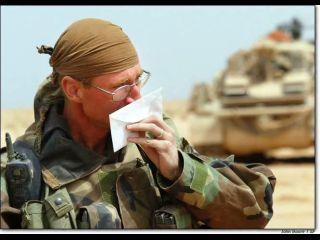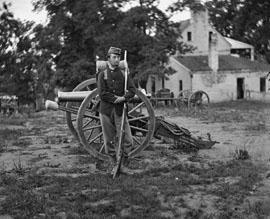Soldiers in the Civil War did not see battle every day, or even every week. Most were inactive about 75 percent of the time, thanks to the hurry-up-and-wait nature of warfare. During these down periods, the typical day started at 5 A.M. during the spring and summer months and 6 A.M. during the fall and winter. Soldiers were awakened by reveille, roll call was taken by the first sergeant, and then everyone sat down to breakfast.
Much of a soldier's life is waiting around for orders
During the rest of the day, soldiers engaged in as many as five two-hour drill sessions on weaponry or maneuvers. Most soldiers found these drills extremely boring and tedious; they wanted to fight, not practice, though they realized the drills could mean the difference between life and death when fighting did occur.
Soldiers also cleaned and readied the camp, built roads, dug latrines, gathered wood for cooking and heating, and sometimes foraged for food to supplement their meals. Letters from home kept them going.
[They engaged in] recreation to help them while away the rest of the hours. Those who were able wrote long letters home or read books, magazines, and newspapers when they could get them. Others played cards or engaged in various sports, such as baseball, boxing, and cockfighting.
Of all the hardships soldiers faced in camp, homesickness was probably the most rampant and difficult to cure.

Source
It is the same for a Christian soldier. Exactly the same. We are all called to persevere in the battle, but the battle isn't always at the same pitch every day. While waiting for orders, we go to work, have leisure, engage in drills and practice (corporate worship, study, and prayer). We live for letters from home, which of course is the bible.We're moms, dads, youths, and regular people, living a Christian life ... living in camp, joshing with other soldiers, cleaning our armor and longing for home, until called upon to launch into action. And do you know what that action is?
Standing.
Therefore take up the whole armor of God, that you may be able to withstand in the evil day, and having done all, to stand firm. (Ephesians 6:13)
Praying.
For the weapons of our warfare are not of the flesh but have divine power to destroy strongholds. (2 Corinthians 10:4)
Resisting.
Submit yourselves therefore to God. Resist the devil, and he will flee from you. (James 4:7)
We are not loudly pronouncing binding and loosing in Jesus's name in public places. We do not exorcise demons from every bush. We do not prayer walk a location to assess the enemy's capability. We do not map out the demonic strongholds in a place and gather to scream prophecies at them.
We pray, stand, and resist. We do this because our High Commander has won the battle. The battle is His.
Yes, earth is our camp and sometimes camp life is boring. Sometimes there is a long time between skirmishes and sometimes soldiers enter skirmishes that last a long time. It is an enduring and tiring war, outlasting our lifetimes, unless the Lord comes and raptures us. As President Abraham Lincoln said at the conclusion of the United States Civil War-
Now we are engaged in a great civil war, testing whether that nation, or any nation so conceived and so dedicated, can long endure. We are met on a great battle field of that war. We have come to dedicate a portion of that field, as a final resting place for those who here gave their lives that that nation might live. It is altogether fitting and proper that we should do this.Read that with understanding that when Lincoln says 'nation' we understand that nation to be the kingdom of God. Understand the soldiers who died and are buried here precede us in the long battle. And indeed, the world as Lincoln says, does not like what we do but they cannot ignore it and cannot forget it. We have a great task, and it is our measure of devotion to our Commander that these soldiers who went on before us have not died in vain and that one day, the kingdom of Jesus shall not perish from the earth but shall endure forever.
But, in a larger sense, we can not dedicate, we can not consecrate, we can not hallow this ground. The brave men, living and dead, who struggled here, have consecrated it, far above our poor power to add or detract. The world will little note, nor long remember what we say here, but it can never forget what they did here. It is for us the living, rather, to be dedicated here to the unfinished work which they who fought here have thus far so nobly advanced. It is rather for us to be here dedicated to the great task remaining before us—that from these honored dead we take increased devotion to that cause for which they gave the last full measure of devotion—that we here highly resolve that these dead shall not have died in vain—that this nation, under God, shall have a new birth of freedom—and that government of the people, by the people, for the people, shall not perish from the earth.

